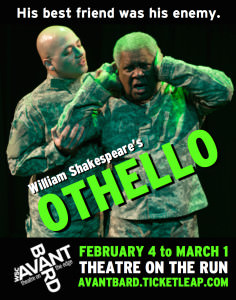On horror’s head horrors accumulate. (Othello Act 3, Scene 3)
So why did Othello do what he did? Why did he take the life of Desdemona, the woman he loved? Why did he take his own life? Certainly these are questions that have been asked in the centuries since Shakespeare gave us The Tragedy of Othello, The Moor of Venice.

Are the usual suspects for Othello’s deeds the only ones to consider? Is there anything new to glean from the text or from life in contemporary times? Is there rationale other than what is the plentitude of racism, jealousy, betrayal and life as an outsider?
WSC Avant Bard‘s Artistic Director and director of the upcoming production of Othello Tom Prewitt pondered what other causal factors might be responsible for Othello’s acts of rage aimed at others and himself? As he considered the text of Othello and these current days of constant war, an impression stuck with him. Perhaps it was war’s unanticipated consequences on its participants. Call it “shell-shock,” “battle-fatigue.” Call it what is now known as Post Traumatic Stress Disorder (PTSD). It is the mind’s and body’s reactions to the constant stresses of battle and war.
In an interview with Tom Prewitt, I investigated what was behind his consideration to connect Othello the man with PTSD While the audience will decide in their own minds, Prewitt hopes those who see the production, “will be touched, moved, perhaps inspired to know more or to reflect more on what they’ve seen and discuss it with others.” Isn’t that what we hope theater can do, especially as I think back upon DC area theater productions in which the health of military warriors are key issues such as Black Watch or Grounded or movies such as The Hurt Locker and the recently opened American Sniper.
David Siegel: What was the impetus for your interpretation of Othello having PTSD?
Tom Prewitt: Early on in the play there’s a speech in which Othello is pleading innocent to charges of witchcraft that have been leveled against him by Brabantio, Desdemona’s father. And Brabantio says, basically, There’s no way my sweet little daughter would ever have married such an old black guy if it weren’t for witchcraft. In answer to these charges, Othello says,’ All I did was tell her war stories.’
And these war stories include such items as the fact that Othello was conscripted into being a mercenary soldier at age seven; he was a child soldier. He was a prisoner of war for a time. He was impressed into slavery for a time. He faced experiences like living among cannibals. We later hear that Othello witnessed a dear friend being blown up right next to him in battle.
Most of these stories are told in the safety of Western Europe, in Venice. Then the play moves to Cyprus—“the mouth of the dog” (as a contemporary of Shakespeare’s, a European historian, called the Muslim world). It’s when Othello gets to Cyprus that he starts to act crazy. He becomes insanely jealous.
And it’s not just Othello; it’s also Cassio. He seems to be very much under control in Venice, where they are initially stationed and where Othello and Desdemona get married. They go on a sea journey, through a tempest, and when they get to Cyprus, Cassio’s alcoholism kicks in. He drinks and gets into a brawl. Iago’s vengefulness toward Othello kicks into high gear as well. So the journey from West to East, from peace and safety into a war zone, acts as a kind of triggering mechanism in the play.
Another factor on my mind was recent events—the Navy Yard shootings a few years ago; the Boston marathon bombing; Littleton, Colorado; Newtown, Connecticut.
To me the central question of the play is, “How can such an such evil exist in our midst? How can one of our own turn on us?” I started thinking about the very closely knit community in Othello. Virtually all the characters except for Desdemona and Bianca are military or civilian advisors. How can such a tightly-knit community experience such evil in their midst? What if we stage the play as an investigation into what happened and why?

Without giving away too much about the production, how does Othello’s PTSD affect his relationships? Any hints for readers?
Classic symptoms of PTSD include withdrawal, irritability, inability to focus or make decisions, insomnia and nightmares, forgetfulness, sudden outbursts of rage, self-medication through drugs or alcohol, and, in extreme cases, violence. In this play it’s not only Othello who exhibits many of these symptoms but also Cassio and, one could argue, Iago and several other characters as well. At one point Othello suffers an episode where he is literally frozen in place, completely unaware of his surroundings or the passage of time. In the past, many if not most productions have interpreted this episode as an example of “epilepsy,” which in Shakespeare’s day was probably a catch-all for any kind of seizure that suddenly afflicts a person, especially a great one like Julius Caesar or Othello. One of our consultants for this production suggested another diagnosis, one more in line with possible side-effects of PTSD: “tonic immobility,” a defense mechanism that is sometimes triggered by traumatic events such as sexual assault or combat, and which leaves the entire body locked into place and the mind completely oblivious for a time.
How might Othello’s PTSD affect the way audiences view Othello?
One of the great mysteries of PTSD, as I understand it, is that we don’t know why it afflicts some people but not others, and there is no way to predict how it will manifest itself or how virulently or when. That Othello is a combat veteran who has witnessed and experienced many of the atrocities of war—including the horror of being forced to became a child soldier from the age of seven—is a given in the text. That he is also celebrated by the civilian leadership of Venice—that he is hailed as a liberator and a protector of their freedoms—is also beyond question. So they anointed him their guardian and sent him off to fight for them in their stead, and then he returned home (their home, not his) a seemingly normal but deeply troubled hero, like our own vets whom we claim to honor at virtually every sporting event, on Veteran’s Day and other national holidays.
And my question is, What do we owe them beyond the occasional special salutation? If they suffered wounds in our place, engaged in combat so that we wouldn’t have to, and they return home to a world they are no longer capable of dealing with and sometimes lash out because of the traumas they have experienced—whose responsibility is it to deal with these unintended consequences of trauma and how? Surely Othello is still morally responsible for his violent behavior—we generally hold folks criminally culpable for their misdeeds even when they are in the grip of mental disorder—but how could his community have helped him by being more vigilant, understanding, educated, or alert? At what point do we intervene to help those who have suffered psychic wounds while fighting our battles? Shouldn’t the family of soldiers and military advisors in the play have known to step in when Othello first struck Desdemona, publically and uncharacteristically and without seeming remorse? These are the questions that haunt me about the play and that, for me, comprise the real tragedy.
How might Othello’s PTSD affect the way audiences assess his taking of lives?
Any way you look at it, the murders and suicide that end the play are deranged and morally inexplicable acts of violence; in his demented state, Othello even tries to cast the murder of Desdemona in biblical terms, as a “sacrifice” to a code of honor and morality derived from a narrow view of the Old Testament at its most vengeful and virulent. But in the end I think he is granted a moment of lucidity, in which he realizes the enormity of what he’s done. And either the pain is too great for him in that moment, or else the pain has grown too great over time; and he (like an estimated 22 U.S. military veterans every day) sees suicide as his only escape. I don’t really know if a PTSD diagnosis does anything to explain or make sense of Othello’s end, other than to place it in a category and a context that has become, tragically, altogether too common and familiar.
What were you seeking in your casting of an actor to portray Othello?
The role is often seen as a traditional leading man’s role, but my reading of the play suggests that Shakespeare has gone out of his way to cast the character as anything but: Othello is much older than a traditional leading man, and the play emphasizes that the marriage between Othello and Desdemona is unlikely to the point of being doomed from the start, at least by the standards of the society in which they live. He is much older than she; she is an aristocrat by birth, and as far as the wide world knows he is an orphan of humble origins (although he has a secret background as the son of kings); and of course, he is of a different race and culture than she, with a skin tone that is proverbially equated in the play with baseness, duplicity, foreignness, even evil. So what I wanted was an actor who could win the audience’s sympathy, initially, who was a plausible leader of men and women in battle, and who was of a certain age and complexion. As soon as I met Chuck Young and worked with him on King John over a year ago, I knew I had my man—if I could convince him to take on such a demanding and difficult role, that is!
Have you been reaching out to military veterans or medical personnel?
Yes, we have been reaching out widely to veterans support groups in the area, first of all to make sure we have our facts and our understanding straight about PTSD and its possible manifestations in the play and in real life. We have also learned in the recent past about the importance of building not just audiences but communities around our productions. I think about the Virginia Woolf fans who flocked to see our production of Orlando, or the way Visible Language was embraced and celebrated by the Deaf community and those who cared about the issues raised by that play—and the great lesson, the great takeaway, was that it helps to have audiences who are alert to and already engaged in the issues raised by a given production, in addition to our normal season subscribers and general ticket-buyers (God bless ‘em!). That eclectic mix of audience members can lead to a more dynamic level of engagement and response, which in turn pays dividends in terms of artistic product, attendance, and word of mouth. Among the most interesting, dynamic, and effective community partners we have engaged so far—whose work will be highlighted in our program and lobby displays—we are particularly excited by our new partnerships with The 296 Project/Studio 296, Serving Together, Give an Hour, and the National Military Family Association.
Othello plays February 4 – March 1, 2015 at WSC Avant Bard performing at Theatre on the Run – 3700 South Four Mile Run Drive, in Arlington, VA. For tickets, call the box office (703) 418-4808, or purchase them online.





